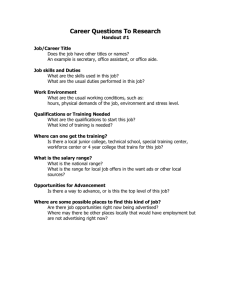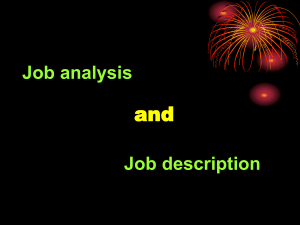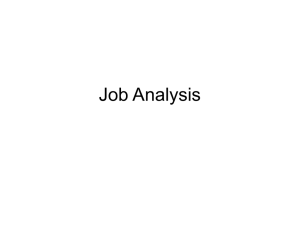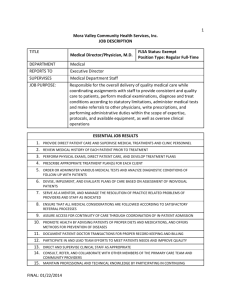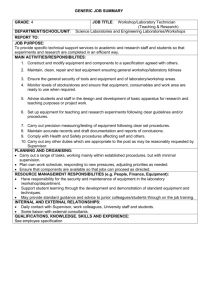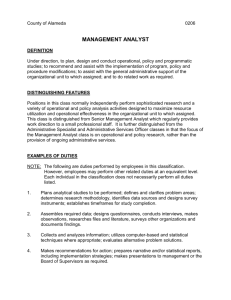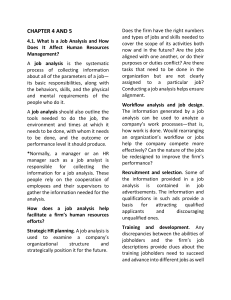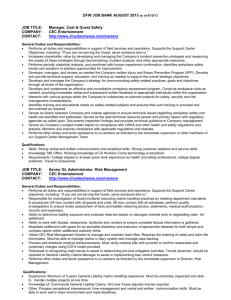chapter3
advertisement
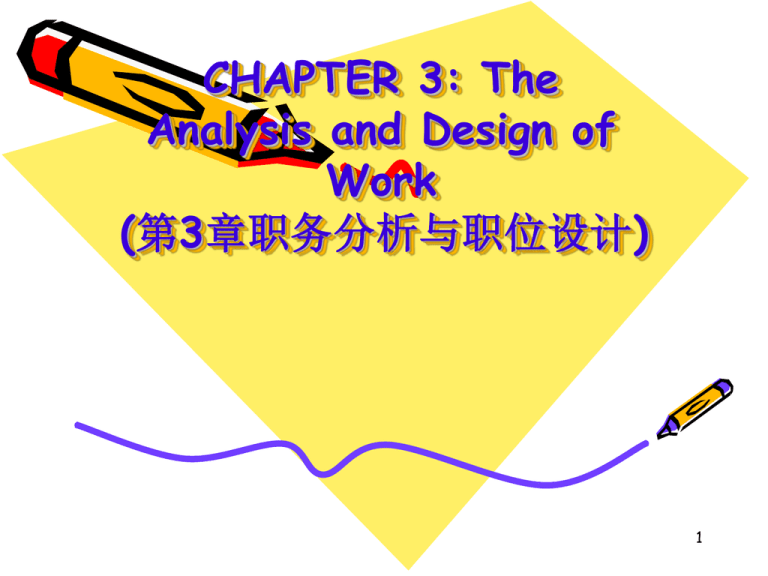
CHAPTER 3: The Analysis and Design of Work (第3章职务分析与职位设计) 1 MAIN CONTENTS • INTRODUCTION TO JOB ANALYSIS • THE PROCESS OF CONDUCTING ANALYSIS • INFORMATION TO BE COLLECTED FOR JOB ANALYSIS • METHODS OF COLLECTING JOB ANALYSIS INFORMATION • HOW TO WRITE JOB DESCRIPIONS AND JOB SPECIFICATIONS 2 一、A GENERAL INTRODUCTION TO JOB ANALYSIS(第一节工作分析概述) • Job analysis • Job description • job specification • Concepts That Are Related to Job Analysis • Job classification • Importance of Job Analysis 3 • 1.Job analysis (工作、职位分析) refers to the process of getting ,analyzing and describing detailed information about jobs information • duties • tasks • Qualifications (aptitudes) • Results :job description / job specification 4 • 2.job description(工作描述书) • A job description is a list of tasks, duties ,and responsibilities (TDRs) that a job entails. 5 • 3.job specification (工作规范书) • A job specification is a list of knowledge ,skills, abilities and other characteristics (KSAOs) that an individual must have to perform the job. 6 4.Concepts That Are Related to Job Analysis(与工作分析相关的一些概 念) • Job Elements (工作要素) • The smallest action unit of job (动作单位) that can not be separated any more. • Task(任务) • Task refers to activities to be undertaken for a special purpose, which consist of one or more job elements 7 • Duty(职责) • It may include One or a few tasks to be performed by an individual on one’s position. • Post(职位/岗位) • One or a few duties to be performed by an individual • Job(职务/工作) • It refers to a group of posts with similar important duties 8 • 岗位的特点: • (1)以事为中心而设置的,岗位不以人而转 移。 • (2)职位不随人走,同一职位在不同的时期 可以由不同的人承担 • (3)岗位数量有限的,岗位的数量被称为编 制。其数量取决于企业工作任务大小、工作复 杂程度和经费状况等因素。 9 5.Job classification(职位分类) Job Series /A job family (职系/工作族) A combination of a group of job levels . Job group(职组) • A combination of a few of job Series Job level(职级 ) • refers to a group of jobs that involve similar job features but require different competences. Job grade(职等) :refer to a group of jobs that involve different job features but require similar competences among different job series. 10 5、Importance of Job Analysis Planning Performance Appraisal Job Evaluation Selection Job analysis Training 11 二、THE PROCESS OF CONDUCTING ANALYSIS (第二节 工作分析的程序) • PRELIMINARIES(准备阶段) COLLECTING INFORMATION(收集信息) • ANALYZING&ORGANIZING (分析和整理) • CREATING END PRODUCTS(完成阶段) 12 THE PROCESS OF CONDUCTING ANALYSIS • 准备阶段:成立工作小组、确定分析职务、利用 现有材料、编制各种调查问卷和提纲 • 收集信息:通过观察法、访谈法和问卷法收集信 息 • 分析和整理:对所收集信息进行分析整理、归纳 总结。 • 完成阶段:撰写两个人事管理文件。 13 三、INFORMATION TO BE COLLECTED FOR JOB ANALYSIS (第三节 工作分析所需收集的信息) • 1. Information To Be Collected • 2. Sources of job Information 14 • 1. Information To Be Collected • Job Context (工作内容) • Job Context (工作背景) Qualifications (任职资格) 15 A、Job Content(工作内容) Job content refers to workers’ job activities-what they actually do on the job. a、Content and task of job b、Individual duty c、 Ways of work d、 Work process e、 Job outcome criteria 16 B、Job Context (工作环境) Job context refers to the conditions under which the work is performed and the demands such jobs impose on the worker. a、Reporting Relationships b、Work environment and work condition c、Work schedule d、Pay and Welfare 17 C、Jobholder Qualifications(任职资格) Qualifications refer to the jobholder’s qualifications needed to perform the job successfully. a、Individual Factors: characteristics, interests and hobbies b、Degree, major and training received c 、Experience d、Knowledge, skills, ability needed, e、 Physical and mental demands 18 2. Sources of job Information Responsibilities Pros Cons Job Holder Supplying information Familiar with job exagger ate the tasks Supervisor Supplying information Supplying detailed information Feel big burden HR Specialist Analyzing Organizing writing Knowing job analysis Methods Unfamiliar with job Job analyst Analyzing organizing writing Possessing Special Techniques Expensive 19 四、METHODS OF COLLECTING JOB ANALYSIS INFORMATION (第四节 搜集信息的方法) Observation(观察法) Interviews(访谈法) Questionnaires (问卷法) Participant Logs(日志法) 20 1.Observation(观察法) • Job analyst observe the work process of the job- holder in work field and record the information concerning work content, duties and context on an outline. • 优:适用于那些常规性和重复性以体力劳动为 主的工作。 • 缺:对于包含有脑力劳动的复杂工作,以及工 作内容、工作方式经常发生变化的工作来说, 观察法就不适用。在观察状态下被观察者表现 出来的行为往往不是其常态行为,影响了信息 的准确性 21 • 观察提纲实例 • 被观察者的姓名 • 工作类型 • 观察内容: 1.什么时候开始工作? 3.上午休息几次? 4.第一次休息时间从 到 到 6.上午完成产品多少件? 一件产品? 8.室内温度是多少? 改进? 日期 工作部门 2.上午工作多少小时? 5.第二次休息时间从 7.平均多少时间完成 9.有些动作是否需要 22 2.Interviews(访谈法) • Job analyst will talk face to face with interviewees to get some information about the job. • Single Interview • Group Interview • Supervisor Interview • 优:工作分析人员无法通过观察来获得信息,可由 此获得。对观察获得的信息加以证实。同时可获得 体力劳动和脑力劳动的信息。 • 缺:访谈法的不足是被访者有时出于自身利益夸大 自己所从事工作的重要性和复杂性,导致工作信息 失真;另外访谈法时间耗费大。 23 访谈提纲实例 • • • • • • • • 1.你的岗位是什么? 2.你对谁负责? 3.你有多少直接下属? 3.你的工作目标是什么? 4.为了实现目标,你的主要工作任务和职责是什么? 5.你认为绩效标准是什么? 6.需要什么条件和环境?工作安全和卫生状况如何? 7.做好这个岗位工作需要什么学历、技能、经验? 8.你认为对一个大学学历的新员工培训多久才能上岗? 24 3. Questionnaires (问卷法) • Having employees and their immediate supervisor to fill out questionnaires is another good way to obtain job information by Job analyst. • General/Specialized Questionnaires • 优:不必亲临工作现场可以快速并且大量收集信息, 使用范围广,费用低,加上标准化、格式化的表格形 式,调查结果易于统计分析。 • 缺:收集的信息受到受填表者主观因素影响较大,设 计技术要求高。 25 Participant Logs(日志法) • The log is a recording by job incumbents of work content, work volume; working time, report relationship etc. The log is kept to hour or even minute which is different from a diary to be kept to day. 26 五、HOW TO WRITE JOB DESCRIPIONS AND JOB SPECIFICATIONS (第五节 工作说明书和规范书的编制) • 1.Content of Job Descriptions • • • • • • . job identification(工作标识) Relationships (工作关系) job statement(工作概述) tasks & duties(工作职责) job authority (工作权限) performance criteria (绩效标准) working condition(工作环境) 27 • 2.Job Specifications (工作规范书) • Typically it covers education , experience, skills and physical& quality 28 3. Job Descriptions Writing • (1)根据工作分析目的内容可繁可简 • (2)形式:既可采用表格形式来表示,也可 采取叙述形式,应该加注工作分析人员的姓名 和人数栏目; • (3)清楚:工作说明书中需要其员工个人了 解的部分应进行全面清晰的描述,力求简明使 员工读后可以明确其工作责任范围; • (4)准确:描述时应使用浅显易读文字,用 语要明确、精炼,明确指出工作种类,便于任 职者把握; • (5)统一:运用统一格式,顺序,编号应该 标准化,注意整体的协调,做到美观大方。 29
